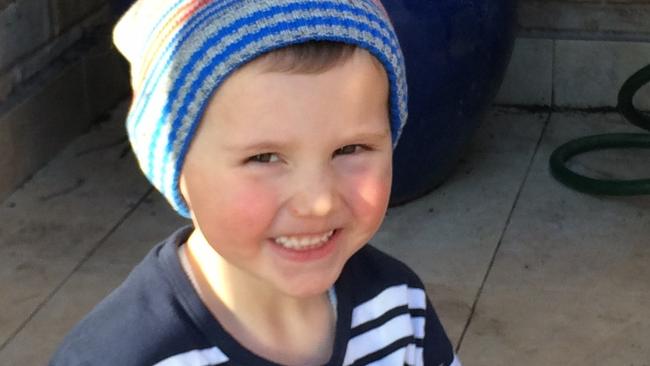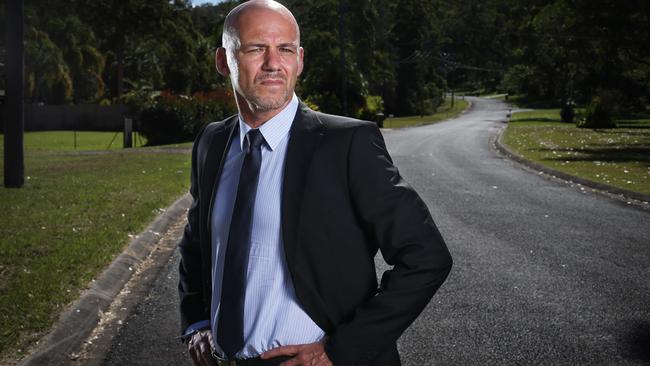William Tyrrell podcast: the missing boy and the baffling police
EXCLUSIVE: Former investigator into William Tyrrell’s disappearance spent months at his desk.

The former head of the strikeforce investigating the disappearance of William Tyrrell spent five months sitting at his desk, listening to whale songs.
Detective Gary Jubelin was placed on desk duties while officials from the professional standards committee figured out ways to permanently remove him from the case.
The Tyrrell investigation — it involves the disappearance of a small child in a Spider-Man suit, who has been missing now for longer than he was known to be alive — could not, they decided, survive an allegation, or even a suggestion of wrongdoing.
Read about our new podcast, Nowhere Child, which launches at 3pm today
Mr Jubelin, head of Strikeforce Rosann from its formation in March 2015 until he quit the force this year, has been charged with four criminal offences related to his handling of the case.
The Australian understands he is accused of recording a conversation without a warrant, and that police brass were concerned that the recording — or its deletion — could jeopardise the case.
Mr Jubelin has strenuously denied wrongdoing and will fight the charges when he faces court the week after next.
His lawyer Margaret Cunneen SC said: “No evidence has been served which lends any support to the preferment of criminal charges against Mr Jubelin, who has always emphatically denied any wrongdoing whatsoever. He will strenuously fight these charges.”
The Tyrrell investigation has torn the NSW homicide squad apart, with allegations of misconduct but also by missteps, particularly early on. It has been bedevilled by confirmation bias, and by turf wars, with senior police at loggerheads over suspects and direction.
William was just three years old when he disappeared from outside a house in the village of Kendall on the NSW mid-north coast, on September 12, 2014.

The Australian launches a podcast investigation today into the case, which attracted the first million-dollar reward for a missing child. It will reveal missteps in the investigation, starting from the early hours, when local police in Kendall failed to establish a crime scene.
The street that William vanished from is not strictly a cul-de-sac — it turns from bitumen to gravel not far from where he disappeared — but you need a four-wheel-drive vehicle to get out the top end.
No cordon was placed at the bottom of the street for days, allowing cars to come and go freely. There is no way of knowing what evidence was lost. The Australian understands police only began talking to drivers whose vehicles were caught on the CCTV at the Kendall Tennis Club, about a kilometre away, in 2017.
Many of the relevant cars have been sold since William disappeared. One has been torched.
The investigation has been plagued by ego-driven disputes, with a perception, on one hand, of swaggering detectives from Sydney being too dismissive of the country cops from Kendall and nearby Port Macquarie.
Local police resented the arrival of the newcomers, too.
There have been accusations of tunnel vision, with some detectives focused to the point of obsession with some persons of interest, while ignoring other, more obvious, leads.
NSW police committed more and greater resources to the Tyrrell investigation than to any other in recent history.
At one point, there were 26 detectives working on the case, with hundreds more chasing leads around the country. At the same time, there were 600 names on the list of persons of interest, and every one was investigated.
The case generated enormous attention, in part because of its rarity — children do not, as a rule, go missing, never to be seen again. When they do, they haunt the imagination for decades.
Mr Jubelin cannot speak on the record, but has told friends that the investigation, which is now in the hands of former colleagues — some of whom he loathes, and vice-versa — has lost ground since he quit the force, unable to properly brief the team that came in after him.
NSW homicide sources say there were always other detectives working just as diligently.
“It’s not the Gary Jubelin show,” said one.
The Australian understands Mr Jubelin was sidelined in an empty office while claims against him were investigated. He was permitted during that time only to look through old police files, with no resources to chase any leads.
When that work ran dry, he turned to the iPod. As a student of martial arts, he regularly meditates, and filled the time with earpods tuned to sounds that kept him calm.
Friends who saw him during that time said he would use the speed-boxing bag in the police gym at lunchtime; and take another 15 minutes for a green tea break in the afternoon.
More than 10,000 people signed a petition to try to save Mr Jubelin’s career, which is now over.
The Tyrrell case — a boy from a disadvantaged background, taken into state care for his own safety, only to go missing — put enormous pressure on police resources.
Troy Grant, a police officer from Dubbo before becoming NSW police minister (he’s since retired), took a strong personal interest after meeting and later befriending the foster family.
Police were hampered by the fierce culture of secrecy at the NSW Department of Family and Community Services, whose junior bureaucrats sought to bully local officers about William’s status as a foster child.
It would be six months before anyone heard from the foster parents, and even then, they had to be interviewed sitting in a dark room, their faces reduced to black blobs.
Some viewers immediately concluded they must be suspects.
They have implacably, repeatedly, denied any involvement in William’s disappearance.
William’s foster mum has told police that he ran around the side of the house, and was out of sight for just a few minutes, and then he was gone.
His foster dad had left the house about an hour earlier, to make a Skype call from a place closer to town, where the internet reception was better.
A coronial inquest into William’s disappearance began in March and will resume on August 5.
The foster family, who have engaged a lawyer, still have William’s sister in their care. She was 4 when her younger brother went missing and is now 9. If William is alive, he would be 8.



